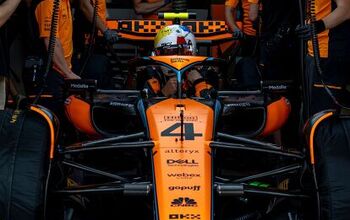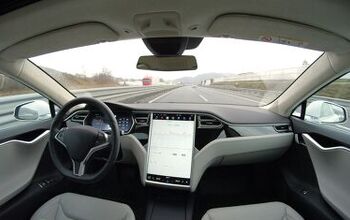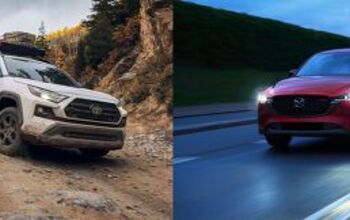Automakers Are Drastically Underreporting Average Emissions: Report

Dieselgate slashed a gaping hole in the assumption that automakers were genuinely invested in building more efficient cars, but it’s hardly the only flimflammery going on behind the scenes. A recent report from Transport and Environment, a European NGO pushing for cleaner transport, found that many automakers are underreporting global emissions by as much as 115 percent.
The good news, at least for Volkswagen, is that we’re not talking about Volkswagen. This time, it’s Hyundai and Kia in the spotlight for underreporting emissions by up to 115 percent. BMW wasn’t much better, as the organization found its reporting fell short by about 80 percent.
Europe’s emissions standards are set to tighten next year and will require financial institutions to report the level of their scope 3 emissions. Scope 3 are indirect emissions that take both upstream and downstream emissions into account. Upstream includes the supply chain, which for automobiles can be pretty dirty. Downstream is a big deal here because it includes emissions emitted after vehicles are sold.
Transport and Environment places some of the underreporting blame on automakers' methods to certify emissions. They focus on the average size of vehicles, lifespan, and where they’re driven, and the organization notes that many companies use selective data to drive down their average emissions. Toyota, as it found, bases its emissions estimates on a lifetime mileage of 100,000 km (62,137 miles), and we all know a Corolla owner with at least four times that many miles on their car.
Since this study took place in Europe, the impact on you may seem minimal and far away, but emissions anywhere affect people everywhere. Moreover, this report shows that many methods we rely on to identify efficient, green vehicles are wrong. Transport and Environment notes that investing one million euros into an oil and gas company finances around 5,500 tons of carbon. An identical investment in the auto industry yields not much less, at 4,500 tons.
However, some automakers go well beyond that, and the most discouraging part is that they’re using what we know are already underreported numbers. Investing a million in the Nissan-Mitsubishi-Renault alliance finances more than 11,000 tons of carbon emissions, and Honda’s not much better at almost 8,000 tons.
[Image credit: Shutterstock.com/All About Space]
Become a TTAC insider. Get the latest news, features, TTAC takes, and everything else that gets to the truth about cars first by subscribing to our newsletter.

Chris grew up in, under, and around cars, but took the long way around to becoming an automotive writer. After a career in technology consulting and a trip through business school, Chris began writing about the automotive industry as a way to reconnect with his passion and get behind the wheel of a new car every week. He focuses on taking complex industry stories and making them digestible by any reader. Just don’t expect him to stay away from high-mileage Porsches.
More by Chris Teague
Latest Car Reviews
Read moreLatest Product Reviews
Read moreRecent Comments
- Daniel J The real problem I see is it's about 8K too much. I'd prefer a lower trim but they don't offer enough HP for my tastes.
- Teddyc73 Beautiful color, although the overused black wheels detract from it. It's nice to see a car in an interesting color instead of the also grossly overused dull greys.
- Master Baiter If you rear-end someone, it's your fault, period. If motorcycles need more time to stop, then riders need to increase their following distance.
- Master Baiter Until recently, virtually every cell phone and computer was made in China and no one seemed to care. The majority are still built there. I'm not a fan of tariffs as it just gives domestic makers a price umbrella to sell their garbage products to U.S. consumers at higher prices.
- Teleedle It would seem that if the Chinese made cars and trucks are ready to compete on the world market that they should be able to compete without the need for government help through subsidies. That's never going to happen with the mindset of their leadership. The rate at which they've transferred the ability to copy to the rate of their abilities to innovate isn't really astounding, but it is truly indicative of their inherent abilities to see through problems and overcome without a lot of fuss. They just have a different way that seems to continually baffle the Western mind. It only goes back a few thousand years. The rest of the world just has to catch up... Without tariffs, three Seagulls could be bought for the price of one loaded Toyota Corolla. I would settle for a nice small pickup truck that can get 30-35 mpg, if the Chinese want to build something with real durability and value. I'm sure they can do that for about $10-12k US, too, dumping them all the way to the bank. Neither Trump or Biden or Bugbrain want that, though. Restrictive 'targeted' tariff ideas indicate that they all want protectionism and the Chicken Tax to continue. The price of living in freedum in the non compete world... and the hallmark of one upmanship by the political class towards more and more expensive transportation related needs. All costs are ALWAYS passed onto the end consumer. Tariffs are the burden of the extra cost. Tariffs are punitive, remember... as intended. The political class is still living off the backs of their constituents throughout the world... same as it ever was.

































Comments
Join the conversation
Those direct injected Hyundais and KIAs are dirty little engines!
I am still trying to figure out how they make those 600 hp engines pass emissions testing without cheating...